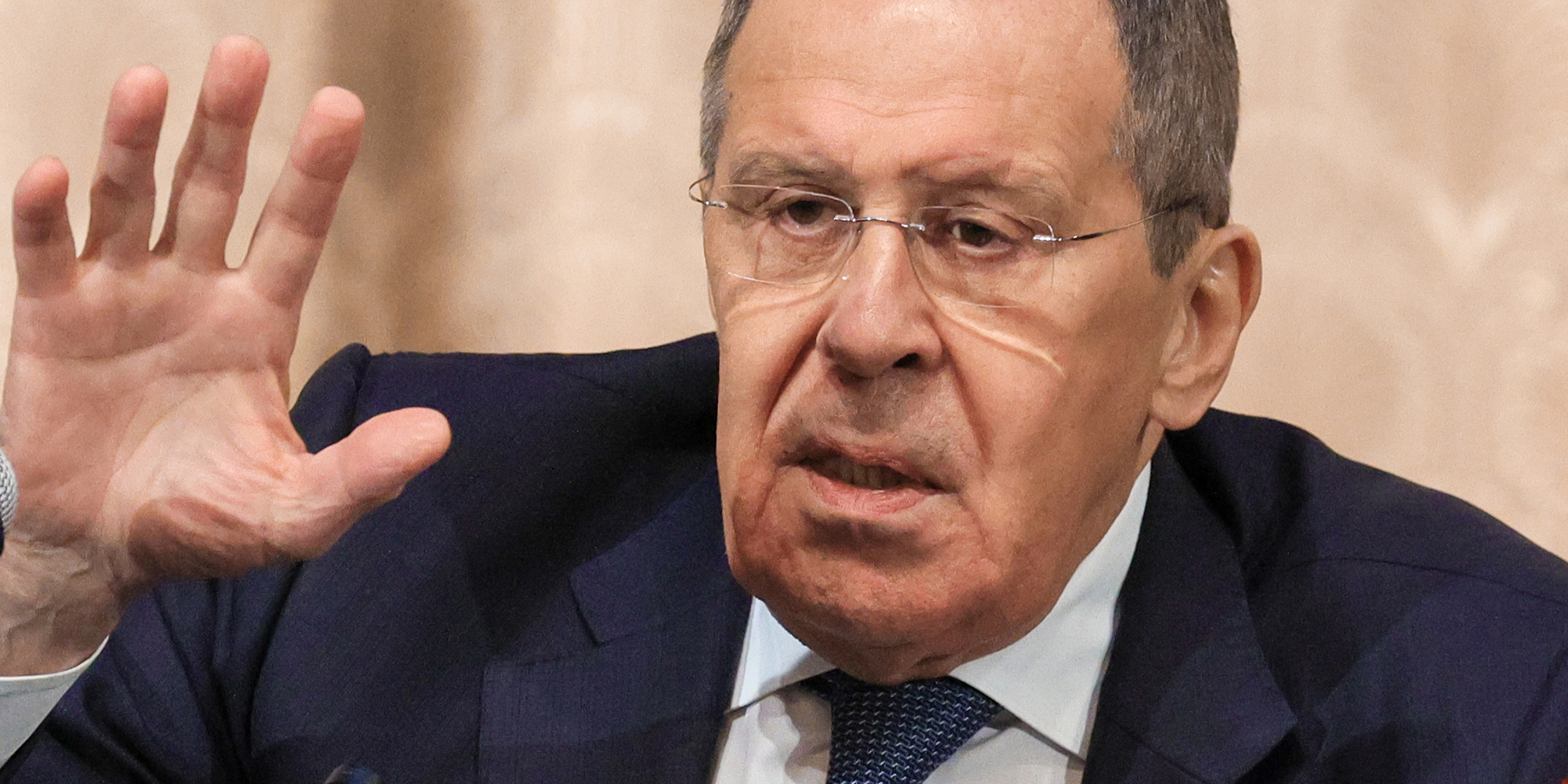Russian Foreign Minister Sergey Lavrov will arrive in Pretoria on Monday while Russia’s military is raining missiles and other munitions on Ukrainian cities, apparently targeting civilians and certainly targeting civilian infrastructure such as power stations, in an apparent attempt to destroy the country’s morale.
These attacks may constitute war crimes, many observers say. But the Department of International Relations and Cooperation (Dirco) on Tuesday merely said that the minister of international relations and cooperation, Naledi Pandor, would host Lavrov “for bilateral talks”.
Earlier, when asked by Russian television whether South Africa would attend the upcoming Russia-Africa Summit in St Petersburg, Pandor did not hesitate, saying: “When we are invited through the African Union, we do tend to attend all summits that involve our African leaders.
“And Russia being such a friend of South Africa, I can’t imagine that we wouldn’t participate. So this second summit will be an important meeting that South Africa should play a role in.”
Business as usual
So it seems to be business as usual between Pretoria and Moscow. But is this the right time for business as usual?
“That depends entirely on your point of view, of course,” says Russian expert Irina Filatova, professor emeritus at the University of KwaZulu-Natal.
“I think that South African policy is wrong not only from the moral perspective but from the point of view of its own interest because it has very little trade with Russia.
“It hasn’t got much economically from Russia. It is purely for historical reasons and also the future reasons, because of the view that Russia is actually offering and promoting, and which I think South Africa is actually subscribing to — at least some people are subscribing to — that the multipolar world which both South Africa and Russia and many other African countries are pining for is going to be better than the domination of the West.
“That is a kind of common cause which China and Russia and South Africa support. So the close relations in that respect are explainable. So, business as usual? It depends who you are. The South African government is obviously of the point of view that it’s all alright.”
Naval exercise
Filatova sees the visit in the context not only of the upcoming Russia-Africa Summit, which she says Russia is promoting very actively, but also of the imminent joint naval exercise off the KZN coast which South Africa will hold with Russia and China.
Lavrov has visited several African countries since Russia invaded Ukraine on 24 February last year. It is believed he will visit several more over the next two months in an intensifying charm offensive as the war drags on into its second year.
Filatova believes Russia is very interested in Africa, but perhaps South Africa particularly, because it needs as much political support as it can get from the developing world during the war.
“But also because South Africa can offer a lot in terms of resources. And Russia can also offer something in return. I expect that the ties will get rather closer, perhaps even in terms of energy supplies and so on.”
BRICS forum
South African officials say another important item on the agenda of the talks on Monday will be the BRICS forum of emerging nations which comprises Brazil, Russia, India, China and South Africa.
Pretoria is chairing BRICS this year and faces the daunting task of managing the demand from several new nations to join BRICS. After last year’s summit, those asking to join included Iran and Venezuela, both pariah states in Western eyes, but firm friends of Russia, raising the prospect that BRICS could become even more of a Moscow support group.
Ukraine invasion
Even though it might mostly be business as usual next week, the war in Ukraine will be discussed, South African officials say. It could hardly not be. But how will it be discussed? Will South Africa just parrot Russia’s narrative that it is conducting a defensive war in Ukraine against neo-Nazi proxy forces fronting for Nato?
Or will Pandor try to put some daylight between Pretoria and Moscow’s positions? On 24 February last year, hours after the first Russian tanks trundled into Ukraine, Pandor’s department issued a statement calling on Moscow to withdraw its forces from Ukraine and to respect that country’s sovereignty and territorial integrity.
But that was essentially the last public and official word of even implied criticism by South Africa of Russia and it is rumoured that President Cyril Ramaphosa was unhappy with Pandor because of it.
So Filatova certainly doesn’t expect Pandor to repeat that demand when she meets Lavrov on Monday. Nor does she expect Pandor will even express concerns about the targeting of Ukrainian civilians.
“I don’t think South Africa believes that Russia is targeting civilians.” She suspects that Pretoria buys Moscow’s line that it is targeting energy and military facilities and that civilians occasionally get hit by sheer accident.
She does believe, though, that Pandor will once again offer South Africa’s help in trying to help mediate peace.
“They will certainly express that wish. They will justify their actions by saying we have already offered to mediate a peace. And we shall try to continue doing that.
“Nobody paid the slightest attention to that of course,” she adds, referring to Ramaphosa’s offer to mediate when he first spoke to Russian President Vladimir Putin about the war last March.
“But it will try to offer mediation again just to save face against its critics,” says Filatova.
Visit Daily Maverick’s home page for more news, analysis and investigations
David Marples, professor of history, classics and religion at the University of Alberta in Canada, believes South Africa could be a valuable mediator in the future. But only if it accepted the need for Russia to withdraw from Ukraine, he implied.
“Russia, for me, has stepped beyond the pale — it is an outlaw and terrorist state that needs to be removed from Ukraine,” he told Daily Maverick.
Filatova notes that South Africans are divided on Russia’s war in Ukraine.
“There is the mainstream media and you know its opinion. There was a poll [conducted by The Brenthurst Foundation] which showed the majority of South Africans are against the war in Ukraine and they are against Russia.
“They think strongly that South Africa should denounce Russia. But I do know there is strong support for Russia — among the EFF, among some circles within the ANC and among the former MK veterans. And among the younger generation, Russia is very popular.”
These divisions complicate South Africa’s diplomacy on the war, she implied. DM





 Russian Foreign Minister Sergei Lavrov delivers a speech to representatives of permanent missions of member states of the African Union, at the Russian embassy in Addis Ababa, Ethiopia, 27 July 2022. (Photo: EPA-EFE / Russian Foreign Affairs Handout)
Russian Foreign Minister Sergei Lavrov delivers a speech to representatives of permanent missions of member states of the African Union, at the Russian embassy in Addis Ababa, Ethiopia, 27 July 2022. (Photo: EPA-EFE / Russian Foreign Affairs Handout)